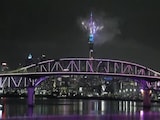Washington:
U.S. officials are wrestling with what type of military strike in Syria might deter future chemical weapons attacks and trying to assess how President Bashar Assad would respond, two senior administration officials said Wednesday. The Obama administration insists the Syrian government must be punished for its alleged use of chemical weapons on civilians last week.
U.S. intelligence agencies are preparing a report laying out the evidence against Assad's government in chemical weapons attacks. The classified version would be sent to key members of Congress, and a declassified version would be released publicly. The White House says it's already convinced, however, and is planning a possible military response while seeking support from international partners.
"If there is action taken, it must be clearly defined what the objective is and why" and based on "clear facts," said one of the senior officials, speaking on condition of anonymity because he wasn't authorized to discuss internal deliberations publicly.
The official said the administration is considering more than a single set of military strikes, and "the options are not limited just to one day" of assault.
The U.S. and international objective of striking Syria would be to damage the government's military and weapons to make it difficult to conduct more chemical attacks, and to make Assad think twice about using such weapons in the future.
Assad has denied using chemical weapons, calling the allegations "preposterous."
No additional U.S. defensive weapons have been deployed in the region in anticipation of Syria responses, the official said. The U.S. already has Patriot anti-missile batteries in Jordan and Turkey.
The other U.S. official said the administration has determined it can contain any potential Syrian military response in the event that President Barack Obama orders a U.S. attack, which likely would be led by low-flying cruise missiles fired from any of four U.S. Navy destroyers off Syria's coast.
The administration in recent days has made clear it believes it must take punitive action against Syria for its alleged use of chemical weapons, which are banned by international convention.
The Aug. 21 attack in the Damascus suburbs killed hundreds of Syrian civilians, Syrian activists say.
The Obama administration is concerned that if Assad is not punished, dictatorial leaders of other nations in possession of chemical weapons, like North Korea, might see the failure to act as a sign that they, too, could get away with using the weapons.
Administration officials have said Assad's actions posed a direct threat to U.S. national security, providing Obama with a potential legal justification for launching a strike without authorization from the United Nations or Congress. However, officials did not detail how the U.S. was directly threatened by an attack contained within Syria's borders. They have not yet presented concrete proof that Assad was responsible.
In Congress, which is in recess until the end of the month, members from both parties have expressed reservations about a rush toward military action without congressional approval. Rep. Adam Smith, the top Democrat on the House Armed Services Committee, warned that an attack might be ineffective and draw the United States into the Syrian civil war.
The U.S. and its international partners were unlikely to undertake military action before Thursday. That's when British Prime Minister David Cameron will convene an emergency meeting of Parliament, where lawmakers are expected to vote on a motion clearing the way for a British response to the alleged chemical weapons attack.
The prime minister's office said Wednesday that it will put forward a resolution to the U.N. Security Council condemning the Syrian government for the alleged chemical attack.
In Geneva, U.N.'s special envoy to Syria Lakhdar Brahimi said any military strike must have Security Council approval.
Meanwhile, U.N. chief Ban Ki-moon pleaded for more time to allow a U.N. inspection team in Syria to establish the facts around the alleged chemical weapons attack and to give diplomacy another chance to end the Syrian conflict, which has claimed more than 100,000 lives in two and a half years.
Obama and Cameron spoke Tuesday, their second known conversation since the weekend. A Cameron spokesman said the two leaders agreed that a chemical attack had taken place, and that the Assad regime was responsible.
Ahead of any strike, the U.S. also planned to release additional intelligence it said would directly link Assad to last week's attack. A U.S. official said the intelligence report was expected to include "signals intelligence" - information gathered from intercepted communications.
Even before releasing that information, U.S. officials said Assad was culpable in the attack, based on witness reports, information on the number of victims and the symptoms of those killed or injured, and intelligence showing the Syrian government has not lost control of its chemical weapons stockpiles.
U.S. intelligence agencies are preparing a report laying out the evidence against Assad's government in chemical weapons attacks. The classified version would be sent to key members of Congress, and a declassified version would be released publicly. The White House says it's already convinced, however, and is planning a possible military response while seeking support from international partners.
"If there is action taken, it must be clearly defined what the objective is and why" and based on "clear facts," said one of the senior officials, speaking on condition of anonymity because he wasn't authorized to discuss internal deliberations publicly.
The official said the administration is considering more than a single set of military strikes, and "the options are not limited just to one day" of assault.
The U.S. and international objective of striking Syria would be to damage the government's military and weapons to make it difficult to conduct more chemical attacks, and to make Assad think twice about using such weapons in the future.
Assad has denied using chemical weapons, calling the allegations "preposterous."
No additional U.S. defensive weapons have been deployed in the region in anticipation of Syria responses, the official said. The U.S. already has Patriot anti-missile batteries in Jordan and Turkey.
The other U.S. official said the administration has determined it can contain any potential Syrian military response in the event that President Barack Obama orders a U.S. attack, which likely would be led by low-flying cruise missiles fired from any of four U.S. Navy destroyers off Syria's coast.
The administration in recent days has made clear it believes it must take punitive action against Syria for its alleged use of chemical weapons, which are banned by international convention.
The Aug. 21 attack in the Damascus suburbs killed hundreds of Syrian civilians, Syrian activists say.
The Obama administration is concerned that if Assad is not punished, dictatorial leaders of other nations in possession of chemical weapons, like North Korea, might see the failure to act as a sign that they, too, could get away with using the weapons.
Administration officials have said Assad's actions posed a direct threat to U.S. national security, providing Obama with a potential legal justification for launching a strike without authorization from the United Nations or Congress. However, officials did not detail how the U.S. was directly threatened by an attack contained within Syria's borders. They have not yet presented concrete proof that Assad was responsible.
In Congress, which is in recess until the end of the month, members from both parties have expressed reservations about a rush toward military action without congressional approval. Rep. Adam Smith, the top Democrat on the House Armed Services Committee, warned that an attack might be ineffective and draw the United States into the Syrian civil war.
The U.S. and its international partners were unlikely to undertake military action before Thursday. That's when British Prime Minister David Cameron will convene an emergency meeting of Parliament, where lawmakers are expected to vote on a motion clearing the way for a British response to the alleged chemical weapons attack.
The prime minister's office said Wednesday that it will put forward a resolution to the U.N. Security Council condemning the Syrian government for the alleged chemical attack.
In Geneva, U.N.'s special envoy to Syria Lakhdar Brahimi said any military strike must have Security Council approval.
Meanwhile, U.N. chief Ban Ki-moon pleaded for more time to allow a U.N. inspection team in Syria to establish the facts around the alleged chemical weapons attack and to give diplomacy another chance to end the Syrian conflict, which has claimed more than 100,000 lives in two and a half years.
Obama and Cameron spoke Tuesday, their second known conversation since the weekend. A Cameron spokesman said the two leaders agreed that a chemical attack had taken place, and that the Assad regime was responsible.
Ahead of any strike, the U.S. also planned to release additional intelligence it said would directly link Assad to last week's attack. A U.S. official said the intelligence report was expected to include "signals intelligence" - information gathered from intercepted communications.
Even before releasing that information, U.S. officials said Assad was culpable in the attack, based on witness reports, information on the number of victims and the symptoms of those killed or injured, and intelligence showing the Syrian government has not lost control of its chemical weapons stockpiles.















